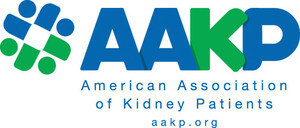Patient Choice Limited by CMS Violations of Legal and Regulatory Authority
CMS Overreach Impacts Timely Access to Phosphorus Therapy Innovations
WASHINGTON, July 18, 2024 /PRNewswire/ -- The American Association of Kidney Patients (AAKP), the largest and oldest independent kidney patient organization in the United States, today issued a formal statement in regard to a lawsuit it has joined against the Centers for Medicare and Medicaid Services (CMS), a U.S. Department of Health and Human Services agency (HHS), responsible for safeguarding the health of individuals living with chronic kidney disease (CKD) and kidney failure as well as the interests of American taxpayers.
The legal action joins AAKP with the National Minority Quality Forum (NMQF), a Washington, D.C. based nonprofit research and advocacy organization, and Ardelyx, a Waltham, Massachusetts based biopharmaceutical company. The lawsuit targets federal statutory and regulatory overreach in the form of CMS's decision to include oral-only phosphate-lowering therapies (PLTs) in the CMS End-Stage Renal Disease (ESRD) Prospective Payment System (PPS). Phosphorus management is a critical issue for many kidney patients on dialysis, and status quo therapies are highly burdensome to patients and are limited in their effectiveness across the kidney population. More effective phosphorus management therapies have long been considered an unmet need by both patients and medical professionals.
In 2023, the U.S. Food and Drug Administration (FDA) approved a safe, new oral therapy for dialysis patients that is viewed by both patients and medical professionals as being less burdensome and more effective for many patients. Failure to adequately manage high serum phosphorus, or hyperphosphatemia, in kidney patients can lead to severe medical complications, costly medical interventions, and a markedly higher risk of death from cardiovascular disease. HHS and CMS officials responsible for kidney patient health have access to, and are aware of, research studies documenting these risks, including research data and fact sheets published by the U.S. National Institutes of Health (NIH).
AAKP FORMAL STATEMENT
"The American Association of Kidney Patients (AAKP) was left with no choice but to join this lawsuit due to the lack of responsiveness by federal officials at the Center of Medicare and Medicaid Services (CMS) to the legitimate, and well known, concerns and unmet needs of kidney patients in regard to care choice and timely access to innovations in phosphate lowering therapies. AAKP has, since 1969, advanced the principles of greater patient care choice, protection of the patient doctor relationship, and alignment of regulatory and payment policies to support treatments that protect patient lives and reduce taxpayer costs associated with chronic disease and severe illness. Based on our careful review of CMS's proposed plan to eliminate separate payment under Medicare Part D for oral only drugs vital to the continued health of patients on dialysis, we believe the agency has failed to protect the best interests of the highly diverse kidney patient population, the medical professionals charged with their care, and American taxpayers. Further, we believe CMS's plan to pay for oral only medicines through the ESRD bundled payment system will reduce patient care choice and timely access to important medications for dialysis patients, stymie desperately needed innovation, and exacerbate the very inequities in kidney patient care CMS publicly claims to be an agency priority. CMS's plan to bring oral only drugs into the bundle is not only bad public policy, but also fully inconsistent with applicable law, CMS's own regulations, and its decades long commitment to improve the health of Americans suffering from life-threatening kidney disease."
About the American Association of Kidney Patients (AAKP): Since 1969, AAKP has been a patient-led organization driving policy discussions on kidney patient care choice and medical innovations to improve patient lives and prevent avoidable illness, disability and death. AAKP advocates played a central role in the Congressional authorization of Medicare coverage for dialysis and transplantation (1972), signed by President Richard Nixon (1973), which evolved into the modern End Stage Renal Disease Program. Over the past decade, AAKP patient advocates have helped advance the passage of the bipartisan law modernizing the Organ Procurement and Transplant Network (OPTN) via greater competition and oversight (2023); lifetime transplant drug coverage for kidney transplant recipients (2020); the presidential Executive Order on Advancing American Kidney Health (2019); new job protections for living organ donors under the Family Medical Leave Act (FMLA) via the U.S. Department of Labor (2018); and Congressional legislation allowing HIV-positive organ transplants for HIV-positive patients (2013). Follow AAKP on social media at @kidneypatient on Facebook, @kidneypatients on Twitter, and @kidneypatients on Instagram, and visit http://www.aakp.org for more information.
MEDIA CONTACT:
Jennifer Rate
Director
Communications & Digital Operations
[email protected]
(813) 400-2394
SOURCE American Association of Kidney Patients

WANT YOUR COMPANY'S NEWS FEATURED ON PRNEWSWIRE.COM?
Newsrooms &
Influencers
Digital Media
Outlets
Journalists
Opted In





Share this article